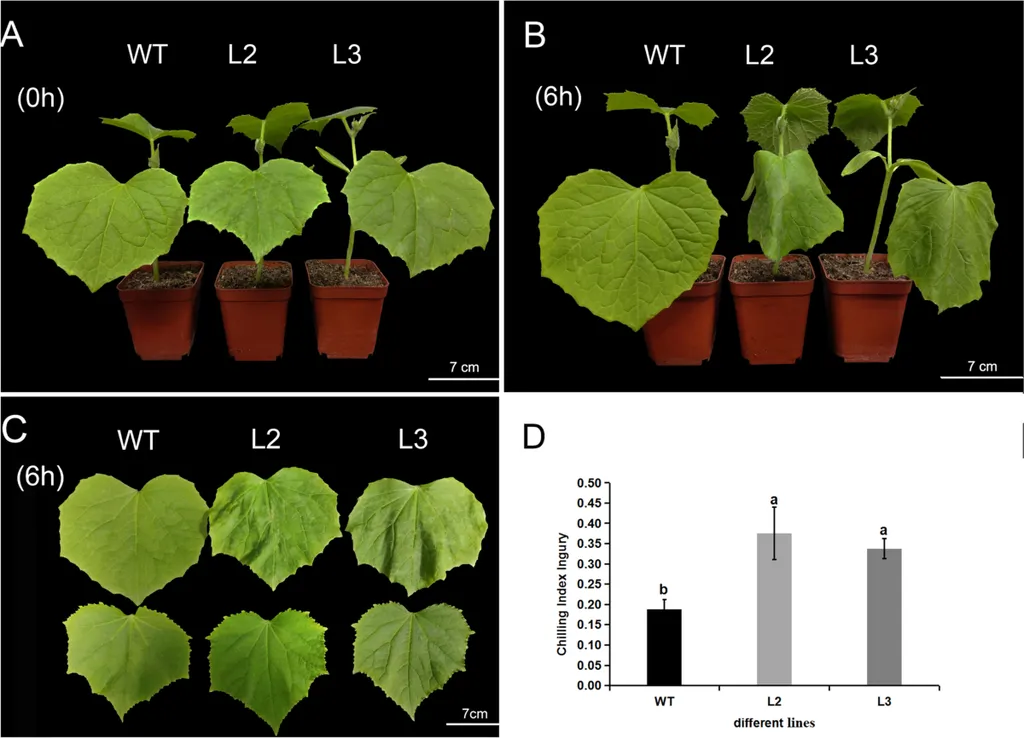In the quest to enhance crop resilience, a groundbreaking study led by Panpan Yu from the School of Breeding and Multiplication at Hainan University’s Sanya Institute has unveiled the potential of vitamin C (Vc) to bolster cold tolerance in grafted cucumber seedlings. Published in the esteemed journal ‘Plants’ (translated from Chinese), this research offers a promising avenue for sustainable agriculture in low-temperature regions.
Cucumbers, highly sensitive to cold, often face stunted growth and reduced yields when exposed to low temperatures. However, grafting cucumbers onto cold-tolerant rootstocks, such as pumpkin, can significantly improve their resilience. Yu and her team explored the physiological and molecular mechanisms by which exogenous Vc application further mitigates cold stress in these grafted seedlings.
The study employed cucumber ‘Chiyu 505’ as the scion and pumpkin ‘Chuangfan No.1’ as the rootstock, using the whip grafting method. At the third true leaf expansion stage, seedlings were treated with varying concentrations of Vc (50, 100, 150, and 200 mg L⁻¹) through foliar spraying. After subjecting the seedlings to cold stress (8 °C) for three days, the researchers assessed morphological and physiological parameters.
The results were striking. “The 150 mg L⁻¹ Vc treatment was the most effective,” Yu explained, “significantly reducing the cold damage index while enhancing the root-to-shoot ratio, root vitality, chlorophyll content, and activities of antioxidant enzymes like SOD, POD, and CAT.” This treatment also boosted levels of soluble sugars, soluble proteins, and proline compared to the control. However, the 200 mg L⁻¹ treatment elevated malondialdehyde (MDA) content, indicating potential oxidative stress.
To delve deeper into the molecular mechanisms, the team conducted a transcriptomic analysis. Leaves from the 150 mg L⁻¹ Vc and control treatments were sampled at 0, 1, 2, and 3 days of cold stress. Differential gene expression revealed that genes associated with photosynthesis (LHCA1), stress signal transduction (MYC2-1, MYC2-2, WRKY22, WRKY2), and antioxidant defense (SOD-1, SOD-2) were initially up-regulated and subsequently down-regulated. These findings were validated through qRT-PCR.
The implications of this research are profound for the agricultural sector. By understanding how Vc modulates gene expression networks related to photosynthesis, stress response, and antioxidant defense, farmers can develop targeted strategies to enhance cold tolerance in grafted cucumbers. This could lead to improved yields and sustainability in regions prone to low temperatures.
Yu’s work not only sheds light on the physiological and molecular mechanisms underlying Vc-mediated cold stress tolerance but also paves the way for developing Vc biostimulants. These biostimulants could revolutionize the way we approach crop cultivation in challenging environments, ultimately contributing to food security and sustainable agriculture.
As the global population continues to grow, the demand for resilient and high-yielding crops will only increase. This study provides a crucial step forward in meeting that demand, offering a glimpse into the future of agricultural innovation.

